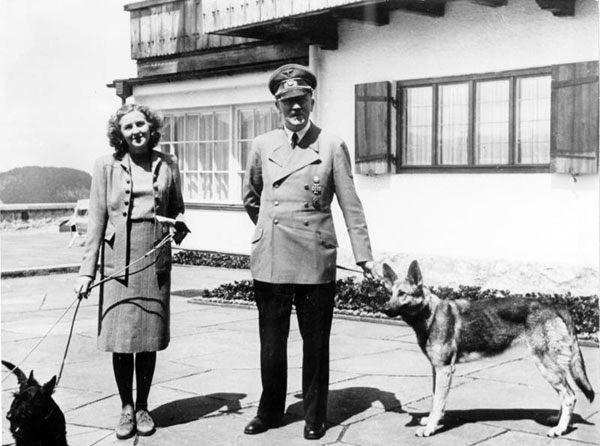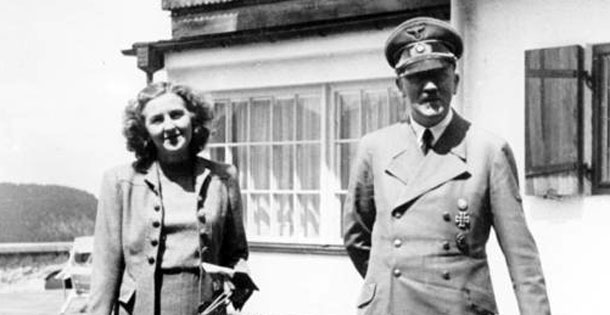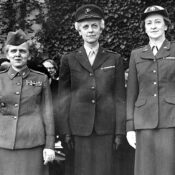After nearly 10 years of courtship, Eva Braun must have been asking herself the question on a daily basis: Is Adolf ever going to propose? Her family was wondering, too. Eva had spent so much time with Adolf Hitler, and for so long, that Europe was starting to talk.
Even the British were wondering about Adolf Hitler’s intentions. An American ambassador reported that many in Great Britain wanted to know when “that Hitler person would get married and settle down.” Maybe they assumed Hitler’s conquest of Europe was the sort of thing a bachelor might get up to, with an abundance of time and energy. (At 50 years of age, Hitler was a little old to be sowing wild oats.) Still, there was the hope that a wife could find a positive outlet for all that conquering energy.
Eva must have felt she was well qualified to be Frau Hitler, or she wouldn’t have stuck with Hitler so many years. In his December 16, 1939, Post article “Is Hitler Getting Married?” Richard Norburt reported information “from sources inside Germany which we have always found dependable” that the two had been carrying on their “colorless little love affair” for over a decade.
But wedding bells wouldn’t be ringing for the Hitlers any time soon. As the Führer told a women’s organization in Nuremburg, “I should love nothing more dearly than a family. … When I feel I have accomplished my historical mission, I intend then to enjoy the private life which I have hitherto denied myself.”
That wasn’t soon enough for the Braun family. They decided to put some pressure on Hitler to name a date. Unfortunately, they chose a bad time to confront Hitler (which was pretty much any time). In late August of 1939, as Hitler was feverishly putting the final touches on his invasion of Poland, a group of Eva’s female relatives drove down to Salzburg to tell Adolf he’d better do the right thing by their “Evi.”
Hitler was a master negotiator. He dodged the family’s ultimatums, but soon after their Salzburg meeting he “ordered part of his personal suite in the Chancellery [his Berlin headquarters] prepared for Evi’s use, and she promptly moved in.”
As part of Hitler’s official household, Eva became a cheerful hostess at Hitler’s Bavarian mountain home. She liked to cook for Adolf, and specialized in preparing the vegetarian dishes he liked. In her spare time, she enjoyed making rag dolls, taking photographs, and reading detective stories. Once, she had enjoyed playing the accordion, but she traded it in for a mandolin, perhaps believing the squeezebox was not refined enough for the Third Reich.
She was showing her support for the war effort by saving fuel. She stopped driving the Horch limousines Hitler had given her, preferring an ivory-colored Volkswagen. She tried to stay informed on news of the war. Perhaps she hoped that someday, as Frau Hitler, she would help Adolf in his great mission, discussing strategy with him and helping with his negotiations. As Richard Norburt reported, “A few weeks ago, when the German minister to Denmark returned to Berlin to consult with Hitler, the two men walked together in the garden of the Chancellery. After a little while they were joined by Evi, and Hitler’s guards were amazed to see her actively participating in their sober conversation.”

(Image courtesy Wikimedia Commons)
Until the day when Hitler got down on his knee to propose, she spent her days sunning herself on the stone porch at Hitler’s house in the Bavarian mountains. There she would smile at visitors, engage in small talk, be pleasant, and wait for Adolf to get out of his meetings.
And in those empty hours, maybe she envied the family life of Europe’s other dictators.
Spain’s General Francisco Franco, for example. He had proposed to María del Carmen Polo y Martínez-Valdés in 1923, but had postponed the wedding when the Spanish king promoted him to command the Spanish Foreign Legion. Yet, unlike Hitler, Franco had only put off the wedding a few months, not years. He and Carmen Polo were married that October, and by 1939 were raising a teenage daughter.
And then there was Benito Mussolini — Italy’s fascist warlord who wasn’t shy around women. He had married Rachele Guidi in 1915, and had fathered six children by 1939. Guidi was devoted to Mussolini, though Il Duce didn’t seem to reciprocate that devotion.
And even Hitler’s ally Joseph Stalin was a family man, of sorts. Though a widower in 1939, he had been married twice and had three children.
All the other dictators were starting families. What was Adolf’s problem?
Eva probably didn’t know that life with a dictator was often bitter and short. She, like most of Italy, couldn’t have known that when Mussolini married Rachele Guidi he was already married to Ida Dalser and had a son with her. Instead of seeking a divorce to Dalser, he simply denied he’d ever been married to her, then ordered government agents to destroy any records of the marriage. Still insisting she was married to Il Duce, Dalser was eventually detained, against her will, in a psychiatric hospital where she died in 1937. Their son was put up for adoption. He grew up and enlisted in the Italian Navy. But, like his mother, he refused to be silent about the marriage. He continued to assert that Mussolini was his father. He, too, was sent to a psychiatric hospital, and soon after, died there.
Stalin’s case was even more sinister. In 1906, he’d wed Ekaterina Svanidze in the Russian province of Georgia. They had a boy before she died of tuberculosis the following December. In 1919, Stalin married again. His new wife, Nadezhda Alliluyeva, gave birth to a boy and a girl. Yet, as anyone — other than Eva Braun, maybe — might have expected, marriage to a dictator was not as much fun as it looked. Alliluyeva learned, as did all of Russia, that Stalin was very hard to live with. The couple frequently argued and, in 1932, after they quarreled bitterly at a party, she went home and shot herself.
Stalin appeared to have been fairly affectionate toward his daughter, Svetlana. He didn’t care much for either of his boys, though, probably because he didn’t see any promise of a ruthless dictator in either of them. Bullied by his father, the eldest boy, Yakov, shot himself, but survived. (“He can’t even shoot straight,” Stalin is reported to have sneered.) Yakov joined the Red Army, was captured, and died in a German concentration camp. His stepbrother, Vasily, survived the war but, after Stalin’s death, was sentenced to eight years in a labor camp. Svetlana defected to the U.S. in 1967.
It’s possible Eva would have stuck with Adolf even if she’d known what had happened to the other dictators’ families. She remained with him even though she must have known of his murderous policies, the millions of deaths he ordered. But she was, in her quiet way, as much a fanatic as him.
She hoped to share his dream, but wound up in his nightmare. Eva and Adolph married, at last, on April 29, 1945. The couple enjoyed a short, underground honeymoon before committing suicide the next day.
Become a Saturday Evening Post member and enjoy unlimited access. Subscribe now



